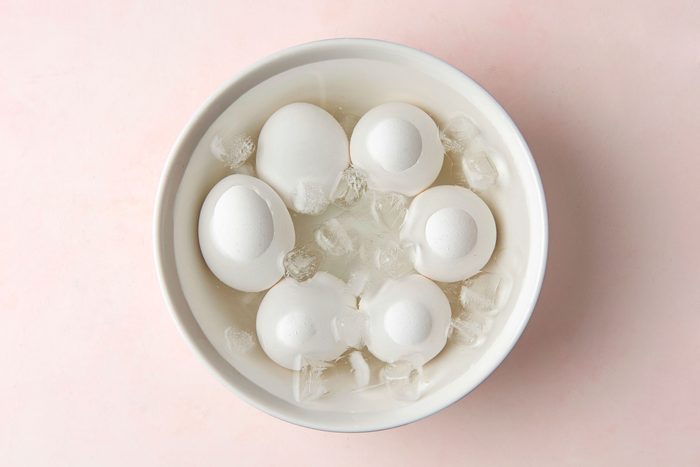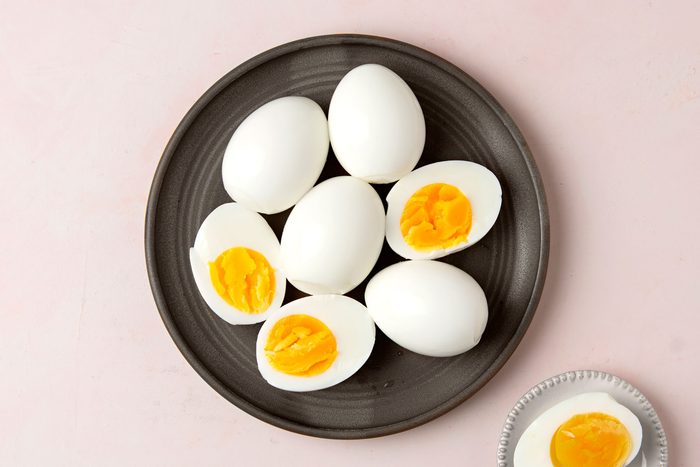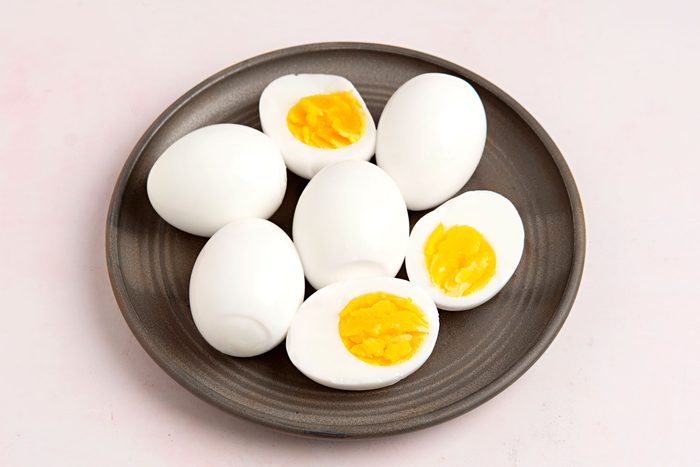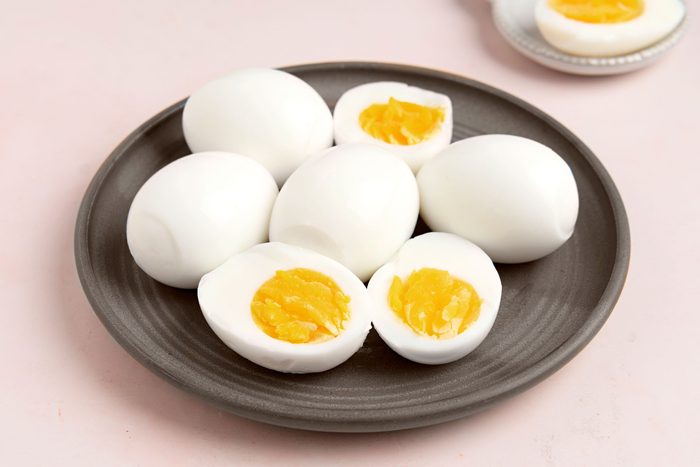Pressure-cooker hard-boiled eggs are the easiest eggs to peel. The foolproof 5-5-5 method produces eggs with perfectly set yolks and shells that easily slip off every time.

Pressure-Cooker Hard-Boiled Eggs

Hard-boiled eggs are the one item I consistently meal-prep every week. They’re my go-to whenever I need a nutritious grab-and-go breakfast or a healthy protein to add to a salad or snack plate. Plus, it’s so easy to use up leftover hard-boiled eggs. They’re a key component in two of my family’s favorites: classic egg salad and deviled eggs.
There are about as many ways to cook hard-boiled eggs as there are ways to enjoy them. If you haven’t mastered the art of boiling eggs on the stovetop or prefer a more hands-off approach, pressure-cooker hard-boiled eggs will be your new BFF. Cooking hard-boiled eggs in a pressure cooker creates perfectly cooked eggs with firm whites, creamy yolks and shells that slip right off.
What is the 5-5-5 method for eggs?
The 5-5-5 method is a technique used to hard-boil eggs in a pressure cooker. It’s also an easy way to remember the recipe to pressure-cook hard-boiled eggs. There are three steps in the 5-5-5 method:
- Pressure-cook your eggs on high for five minutes.
- Let the pressure release naturally for five minutes before quick-releasing any remaining pressure.
- Plunge the eggs into an ice water bath and let them stand for five minutes.
You can use this method to cook eggs in an electric or stovetop pressure cooker. The steps are the same whether you want to cook just one egg or half a dozen eggs. However, the timing applies to only large eggs. For extra-large or jumbo eggs, the cooking time should be increased to seven or eight minutes, respectively.
Ingredients for Pressure-Cooker Hard-Boiled Eggs
- Eggs: You can use any type of large egg, such as white, brown, pastured or cage-free. If your eggs are older, a float test is a quick way to tell if an egg is bad. Room-temperature eggs are less likely to crack as they cook, so we recommend removing your eggs from the fridge about 30 minutes before cooking.
- Cold water: Water produces steam as it heats under pressure and cooks the eggs. Starting with cold water helps the eggs cook evenly.
- Ice cubes: Cooling your eggs in ice water stops the cooking process so you don’t end up with rubbery whites or yolks with an unappetizing greenish hue—both are signs of overcooked eggs.
Directions
Step 1: Prepare the pressure cooker

Place a trivet insert and 1 cup water in a 6-quart electric pressure cooker. Set the eggs in a single layer on the trivet. Lock the lid and close the pressure-release valve.
Editor’s Tip: If you don’t have a trivet insert, you can use a silicone or stainless steel steamer pot designed to fit an electric pressure cooker.
Step 2: Pressure-cook the eggs
Set your pressure cooker to cook on high for five minutes.
Step 3: Release the pressure
After cooking, let the pressure release naturally for five minutes. Then, turn the steam valve to quick-release any remaining pressure.
Editor’s Tip: Use long-handled tongs to release the pressure valve on an electric pressure cooker to prevent getting burnt from the spattering steam.
Step 4: Cool the eggs

Rinse the eggs in cold water and place them in ice water until completely cooled. Drain the eggs and refrigerate.
Editor’s Tip: Prepare the ice bath while the eggs are cooking so it’s ready to go! It should take only about five minutes for the eggs to cool once they’re in the ice bath.
Step 5: Remove the shells

Remove the shells. If desired, cut the eggs before serving.

Recipe Variations
- Pressure-cooker soft-boiled eggs: For eggs with a runny yolk, reduce the cooking time to three minutes.
- Pressure-cooker medium-boiled eggs: For eggs with a medium-firm yolk, reduce the cooking time to four minutes.
How to Store Pressure-Cooker Hard-Boiled Eggs
Eggs should be completely cooled before storing them in an airtight container. Hard-boiled eggs last in the fridge for up to one week—plenty of time to use up leftover hard-boiled eggs.
To peel or not to peel your eggs is a matter of personal preference. You can store unpeeled eggs or peel all your eggs before storing, but peeled eggs can give off an eggy odor and absorb other off-flavors and smells from your fridge.
Can you freeze pressure-cooker hard-boiled eggs?
Unfortunately, hard-boiled eggs are not a freezer-friendly food. The egg whites take on a tough, rubberlike texture when frozen and thawed.
Pressure-Cooker Hard-Boiled Egg Tips

Can you stack eggs on top of each other in a pressure cooker?
Eggs shouldn’t be stacked when being pressure-cooked. Stacked eggs can rattle around and collide during cooking, which can lead to cracks and leaks before the eggs are cooked. The number of eggs that fit in a single layer will depend on the size of your pressure cooker. If you want to make a large batch of hard-boiled eggs in a pressure cooker, we recommend cooking them in multiple batches.
Why do my eggs crack in the pressure cooker?
Eggs can crack during pressure cooking if they rattle around and bump into each other, which can be avoided if they’re cooked in a single layer. Eggs can also crack if they are too cold, so try taking them out of the refrigerator at least 30 minutes before cooking to let them warm to room temperature. If you forget or are short on time, you can quickly warm your eggs by placing them in a bowl of warm water for a few minutes.
Can you pressure-cook hard-boiled eggs in a stovetop pressure cooker?
Yes, you can hard-boil eggs in a stovetop pressure cooker. Cook the eggs on high pressure for five minutes. Let the pressure release naturally until your indicator shows that the pot is no longer under pressure. Remove the lid according to the manufacturer’s safety directions and plunge the eggs into an ice water bath for at least five minutes.
Pressure-Cooker Hard-Boiled Eggs
Ingredients
- 6 large eggs
- 1 cup cold water
Directions
- Place trivet insert and 1 cup water in a 6-qt. electric pressure cooker. Set eggs on trivet. Lock lid; close pressure-release valve. Adjust to pressure-cook on high for 5 minutes. Let pressure release naturally for 5 minutes; quick-release any remaining pressure. Rinse eggs in cold water and place in ice water until completely cooled. Drain and refrigerate. Remove shells; if desired, cut eggs before serving.
Nutrition Facts
1 egg: 72 calories, 5g fat (2g saturated fat), 186mg cholesterol, 71mg sodium, 0 carbohydrate (0 sugars, 0 fiber), 6g protein. Diabetic Exchanges: 1 medium-fat meat.




















